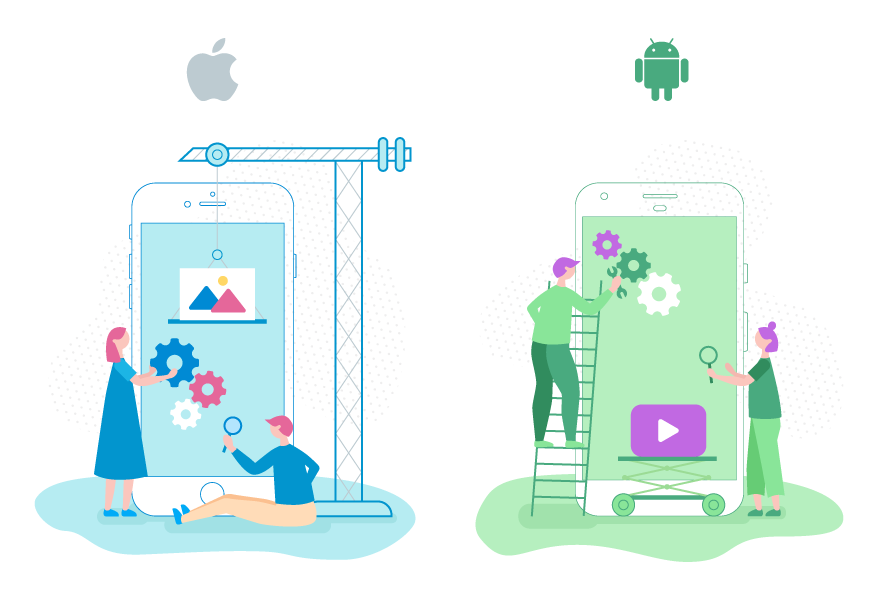Mobile app development is one of the leading fields in the IT industry, today. When it comes to creating a mobile application, it is impossible to avoid the topic of the tools used in this process. When you are working on your mobile app project, you are presented with a lot of different options depending on the OS your app is going to be running on – iOS, Android or Microsoft. Web developers usually choose one instrument that is considered to be the most effective to build a mobile app, be it JavaScript or any other platform.
Xamarin is becoming more widely used and we will try to answer the question ‘why’ today. In order to do that, let’s take a look at the battle of Xamarin vs Native 2018 to see if Xamarin is truly worthy to compete with native app development, and why.
What Is Xamarin?
Xamarin represents a relatively new and efficient instrument for cross-platform mobile app development. Its main distinguishing feature is that Xamarin allows users to share the code across the main platforms. It’s important to note that the percentage of the code shared can reach over 90%.
—
Xamarin was originally built as an open source development tool in 2001, based on the .NET Framework. In 2011, the Xamarin developer team started its own company.
Xamarin is developed on the basis of a Microsoft technology stack, with all its peculiarities. As of now, the community of Xamarin users has exceeded 1 million. Notably, Xamarin gained its popularity as an instrument for developing cross-platform mobile apps after it became a part of Microsoft Corporation (Microsoft acquired this commercial project in 2016).
The language used in Xamarin is C# which makes it possible to build native-looking apps while ensuring their high performance. Since C# is a part of the .NET framework, it is compatible with various useful features, including LINQ, Asynс, Lambdas and many more.
Xamarin allows mobile apps to perform well on different platforms, including but not limited to the native ones. That’s why using Xamarin over native development seems to be the better choice for a more efficient development these days. It transforms building process into a much easier one and provides more opportunities for using an application.
Of course, with its advantages, Xamarin also has its downsides, just like anything else. Do the advantages outweigh the disadvantages? In order to compare the pros and cons of development with Xamarin, let us see what they represent.

Advantages Of Using Xamarin
- C#. This programming language is used to develop mobile apps which will work properly on any platform. Despite their efficiency, such programming languages as Java or Swift failed to evolve properly as C# did, in order to meet the new demands of the evolving market. The quality of this evolution is reflected well in the security improvements. Besides, using C# makes it possible to avoid any unnecessary features. Thus, the code written with C# is cleaner, more reliable and much more readable.
- .NET framework libraries. Xamarin supports all the .NET libraries. This means that executing complex tasks is more convenient and faster.
- Sharing core code. This feature eliminates any possible issues when it comes to the different versions of the app for different platforms. Every function in the code can be easily shared regardless of whether it’s the iOS or the Android version of the application. In this case, the development team’s performance remains highly efficient.
- Easy updating process. Xamarin makes it easy and convenient to update, change and improve the application. In cases of native development, this process has to be repeated over and over each time an app has a new version.
Disadvantages Of Using Xamarin
- Lack of third-party library support. Both Android and iOS have countless libraries designed by third parties that are often used especially for user interfaces. Unfortunately, these cannot be used in Xamarin, which is why developers have to create various bindings for libraries, themselves, which is not time-efficient.
- Update delays. When a new upgrade or update needs to be done, it takes mobile app developers more time to make sure the changes are going to work properly. Sometimes, they have to take some risk and use third-party libraries. This is more than just a time inefficiency, it will also cost you more money.
- Lag time. The most striking example of this downside is that Xamarin’s support for libraries using Swift exclusively is quite limited. What else should be taken into consideration? You’ll need to wait in order to use the latest features. Though Xamarin is great at obtaining interfaces to APIs quickly, APIs don’t usually make up for the whole success of the platform.
What Is Native App Development & Has It Lost Its Popularity?

Native app development is quite common in the industry, as well. The main characteristic of native apps is that they can work on only one platform. That means that the application’s code has to be written separately for each OS from scratch. For instance, if you need solution for Android, you will have to use Java, but, if it’s an iOS app that you want, you’ll use Swift.
—
Native application development is supposed to be the traditional approach for mobile app building. Each OS platform has its own peculiar technical features, as well as software and hardware specifications. That’s why, by their design, the instruments for native app development meet the requirements of each OS specifically.
This allows developers to design apps that have native support and all the components that are required for running on a particular OS. As a general rule, apps designed for a particular platform demand use of a specific layout or design layout for the tablet and smartphone versions separately.
Native app development definitely has its strengths and weaknesses, just like Xamarin does. Let’s take a closer at them.

Native App Development Perks
- Excellent performance. The native app code can access its native OS directly, which significantly improves its performance. The thing is, native apps operate within the OS and interact with hardware faster, which makes the overall performance as highly rated as possible. This is especially important when it comes to graphics and multimedia content in the app, and is the reason why native apps are far less likely to crash.
- Optimized code. Native app development is the best choice for designing and implementing features, according to the OS. That’s why compiling and/or web wrappers aren’t obligatory.
- Native user interface (UI). When you create a native app, various instruments and components are at your disposal to help you create a native user interface that functions exactly the way the user expects it to. This is how you achieve better user engagement.
- Support. You can find a lot of helpful information about the system while creating the native application for the specific OS. For example, when building product for iOS, you may find a lot of reading material and resources to help you out.
- Profitability. This can be considered the main advantage. Native apps have direct access to respective marketplaces. As you are likely to know, each OS has its own marketplace like Google Play for Android or the App Store for iOS. Here, users can find apps they’re looking for, download and install them, and look through various ratings and supporting information. This means that your app will be easier to promote to your target audience, so you can count on strong profits from monetizing a native app.
Native App Development Downsides
- High costs. Native app development requires way more financial resources to build the application. You may want an app for several OSs or some unconventional features, and if it’s the case, it’ll cost you a lot. If you want an app for both Android and iOS, you’ll need to build two apps from a scratch, and that costs money as well.
- Highly-skilled specialists required. The developers of a native application have to possess special skills and know their way around the specific instruments for coding for the particular OS you’ve chosen. Specialists talented in their niche will cost quite a lot, as well. Besides that, it may be quite difficult to find the necessary specialist promptly.
- Time-inefficiency. As we have already mentioned, writing the code for a native app for several OSs basically means writing the code for several apps from scratch, as there’s no way to reuse code written for another OS. This is, obviously, time-consuming, and time is money.
Evidently, the Xamarin vs native comparison suggests that using a tool such as Xamarin for mobile app development is easy, fast and cheap, especially when comparing to product development for a particular platform. The programmer can take the code that has already been written and use it again in the process of Xamarin mobile app development.
To sum it up, we’ve gathered all the information on Xamarin vs native app comparison in the table below.

Conclusion
There’s no doubt that Xamarin cross-platform development has become quite attractive for mobile app developers. When we’re comparing the efficiency of using Xamarin vs. native app development, however, keep in mind that choosing mobile app building tools requires analyzing a wide range of factors.
Both Xamarin and native app development have their advantages and downsides that should be considered individually in every single case. It is up to you to select the most appropriate method for making your app fast, easy-to-use and cost-effective.
If you have any other questions, you can always turn to EGO-cms for answers. We are dedicated to providing consultations and answering any questions that you may have in mind promptly and competently.


















